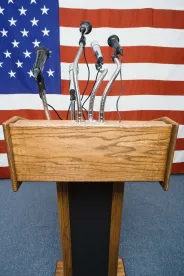Legislative Activity
House Subcommittee Kicks Off Year with Hearing on Multiple Communications Bills
On January 5, the Subcommittee on Communications and Technology (Communications Subcommittee) of the House Committee on Energy and Commerce (House Commerce Committee) announced that it will hold a hearing on January 12 during which it will consider four communications bills. Subcommittee Chairman Greg Walden (R-OR) stated in a press release that the bills under consideration reflect the subcommittee’s continued desire to “protect America’s consumers and small businesses.” The four bills to be considered are:
-
The Amateur Radio Parity Act (R.1301), which requires the Federal Communications Commission (FCC) to adopt rules that would protect amateur radio equipment from the reach of community association rules and architectural standards that can interfere with the installation and operation of amateur radio towers and antennas;
-
The No Rate Regulation of Broadband Internet Access Act (R.2666), which would prevent the FCC from using its Open Internet rules to regulate the rates charged for broadband Internet access service;
-
The Anti-Spoofing Act (R.2669), a bill that cracks down on “spoofing,” a practice where callers change the way their phone number appears on caller identification so as to elude law enforcement or scam the called party; and
-
The Small Business Broadband Deployment Act (discussion draft), a bill authored by Subcommittee Chairman Walden, which would make permanent the FCC’s temporary exemption for small businesses from the enhanced disclosure rules required by the FCC’s Open Internet rules.
This Week’s Hearings:
-
Tuesday, January 12: The Communications Subcommittee of the House Commerce Committee will hold the aforementioned hearing entitled “A Legislative Hearing on Four Communications Bills.”
Regulatory Activity
FCC Announces Tentative Agenda for January 28 Open Meeting
On January 7, the FCC announced that the following items are tentatively on the agenda for the FCC’s January 28 Open Commission Meeting:
-
Expansion of Online Public File. The FCC will consider a Report and Order that would “modernize[] the public inspection file rules by requiring cable and satellite TV operators and satellite radio companies to post public inspection files on the FCC’s online database.”
-
Improving the Nation’s Public Alert and Warning Systems. The FCC will consider a Notice of Proposed Rulemaking to “strengthen the Emergency Alert System” (EAS) by “promoting participation on the state and local levels, supporting greater testing and awareness of EAS, leveraging technological advances, and bolstering EAS security.”
-
Broadband Progress Report. The FCC will consider the 2016 Broadband Progress Report, which “examin[es] whether advanced telecommunications capability is being deployed to all Americans in a reasonable and timely fashion[.]” The FCC released a Fact Sheet discussing the Broadband Progress Report on January 7, which is discussed in detail below.
The Open Meeting is scheduled to commence at 10:30 a.m. on January 28 in Room TW-C305 of the FCC’s headquarters at 445 12th Street S.W., Washington, D.C.
Draft Broadband Progress Report Finds Broadband Is Not Being Deployed in a “Reasonable and Timely Fashion”
On January 7, the FCC released a Fact Sheet discussing FCC Chairman Tom Wheeler’s draft of the 2016 Broadband Progress Report (Report), which the FCC will consider adopting at its January 28 Open Meeting. According to the Fact Sheet, the draft Report finds that “[w]hile the nation continues to make progress in broadband deployment, advanced telecommunications capability is not being deployed in a reasonable and timely fashion to all Americans.”
The Broadband Progress Report is issued annually by the FCC under Section 706 of the Telecommunications Act, which requires the FCC to conduct an annual inquiry into “whether advanced telecommunications capability” (including broadband internet service) “is being deployed to all Americans in a reasonable and timely fashion.” If it determines that broadband deployment is lagging, the FCC is required to “take immediate action to accelerate deployment of such capability by removing barriers to infrastructure investment and by promoting competition in the telecommunications market.”
According to the Fact Sheet, the Report makes various findings supporting its conclusion that broadband is not being deployed in a “reasonable and timely fashion”, including that: approximately 34 million Americans still lack access to fixed broadband at the FCC’s benchmark speed (25 Mbps download, 3 Mbps upload); 39 percent of the rural population lacks access to fixed broadband; and, internationally, the U.S. “continues to lag behind a number of other developed nations, ranking 16th out of 34 countries.”
The Report also finds that “advanced telecommunications capability” requires access to mobile broadband (as well as fixed broadband) given the “increasingly dynamic nature of residential and business communications[,]” but does not set a mobile speed benchmark “given the current record” before the FCC.
The Report details the ongoing FCC, administration, and industry actions intended to increase broadband deployment, including: 10 carriers accepting $1.5 billion in Connect America Fund support to expand rural broadband deployment to 3.6 million homes and businesses by 2020; “modernization” of the E-rate program to better support fiber and Wi-Fi in schools and libraries; and two Mobility Fund auctions in which winning bidders are eligible to receive monetary support to provide 3G or better mobile voice and broadband services in areas where those services did not exist.
FCC Settles Sponsorship Identification Investigation
In a News Release issued by the FCC on January 7, the regulator heralded an Order/Consent Decree (Consent Decree) entered into between the agency’s Enforcement Bureau (EB) and broadcaster Cumulus Media to resolve the Commission’s investigation into whether the company failed to comply with the sponsorship ID rules. According to the news release, the Dover, New Hampshire station broadcast more than 175 announcements supporting a hydro-electric energy project, but none of the announcements identified the sponsor, which had a financial interest in the project. As explained in the settlement, sponsorship identification laws “establish the general obligation of a broadcast station to air sponsorship identification announcements whenever any ‘money, service, or other valuable consideration’ is paid or promised to the station for the broadcast of program material.” In order to terminate the investigation, which was initiated by a complaint, the Consent Decree requires that Cumulus Media pay $540,000 — “the largest payment in FCC history for a single-station violation of the Commission’s sponsorship identification laws.” In addition, the company is required to appoint a Compliance Officer, provide training on the Commission’s sponsorship ID requirements, and create a hotline for reporting violations of the compliance plan.





 />i
/>i

